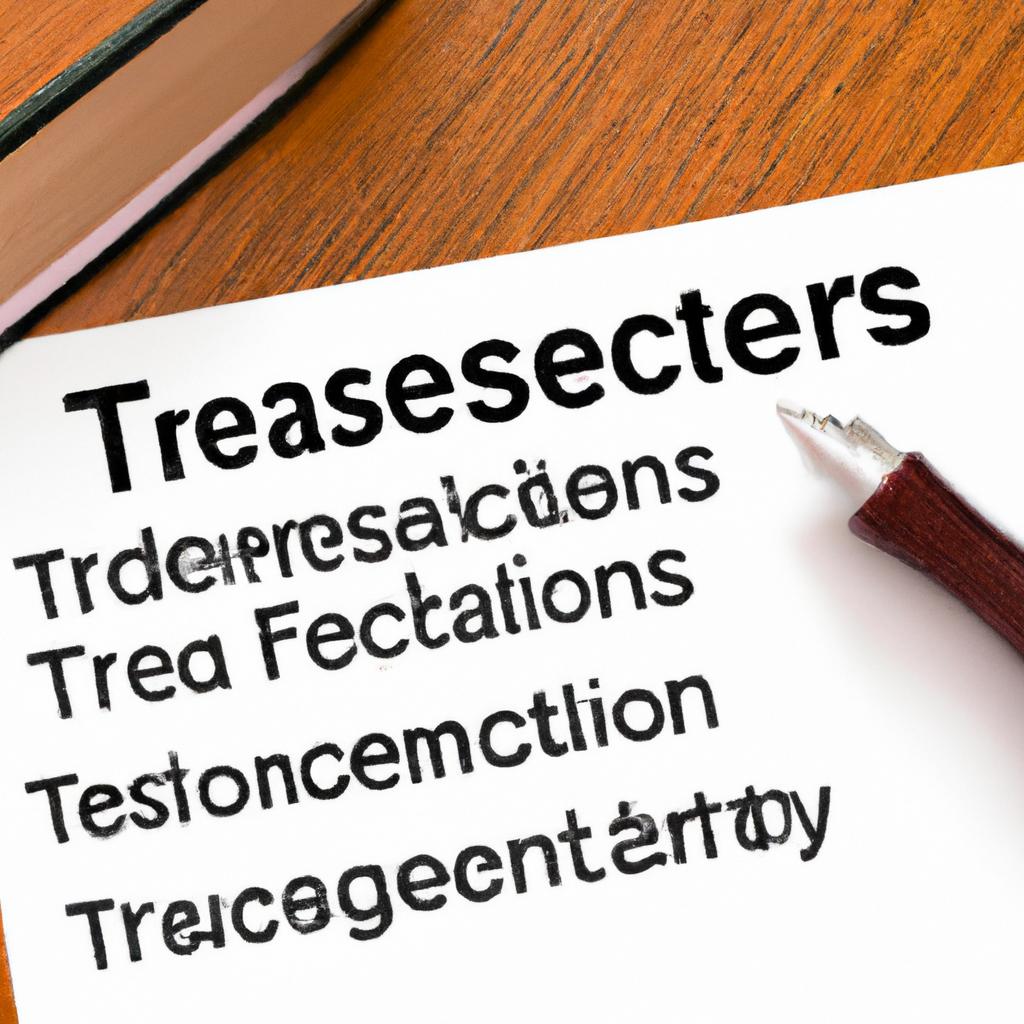As a seasoned legal practitioner at Morgan Legal Group in the heart of New York City, I have encountered numerous intricacies within the realm of estate planning and trust administration. One particularly essential aspect that often arises is the determination of successor trustee fees. In this article, we will explore the nuances surrounding this crucial component of trust administration, shedding light on its importance and considerations for both trustees and beneficiaries alike. Join us as we navigate the complexities of successor trustee fees with precision and expertise.
Understanding the Role of a Successor Trustee in Estate Planning
In estate planning, the role of a successor trustee is crucial in ensuring that the wishes of the trustor are carried out smoothly and efficiently. A successor trustee is appointed to step in and manage the trust assets in the event that the original trustee is unable to fulfill their duties due to incapacity or death. Understanding the duties and responsibilities of a successor trustee is essential for effective estate planning.
When it comes to successor trustee fees, it is important to consider the complexities and time commitment involved in managing a trust. Successor trustees are typically entitled to reasonable compensation for their services, which may vary depending on the size and complexity of the trust. It is common for successor trustees to receive a fee based on a percentage of the trust assets, hourly rates, or a flat fee. Ensuring that the successor trustee is fairly compensated for their time and efforts is essential in maintaining the integrity of the trust.

Factors Influencing Successor Trustee Fees
When establishing successor trustee fees, it is essential to consider various factors that can influence the compensation amount. One factor to take into account is the complexity of the trust assets and administration. Trusts with a large number of assets or intricate investment portfolios may require more time and effort from the successor trustee, warranting a higher fee.
Another important factor to consider is the successor trustee’s level of expertise and experience. Trustees with specialized knowledge in areas such as tax law, finance, or real estate may command higher fees due to their valuable skills. Additionally, the geographic location of the trust and the prevailing market rates for trustee services in that area can also impact the fees charged. By carefully assessing these factors, successor trustees can ensure that their compensation is fair and commensurate with the value of the services provided.

Best Practices for Determining and Negotiating Successor Trustee Compensation
In determining and negotiating successor trustee compensation, it is crucial to consider several best practices to ensure a fair and reasonable fee structure. The following guidelines can help trustees navigate this process effectively:
- Evaluate the Trust Document: Review the trust document thoroughly to understand any provisions relating to trustee compensation.
- Consider the Trust Assets: Take into account the complexity and value of the trust assets when determining an appropriate fee.
- Consult with Professionals: Seek guidance from legal and financial professionals to ensure the compensation is in line with industry standards.
| Trustee Responsibility | Recommended Fee Range |
|---|---|
| Asset Management | $500 - $1,500 per hour |
| Administrative Duties | $1,000 – $5,000 per month |
By following these best practices and conducting thorough research, successor trustees can negotiate a fair compensation package that reflects their responsibilities and the best interests of the trust beneficiaries.

Ensuring Compliance with Legal Requirements for Successor Trustee Fees
When it comes to successor trustee fees, it is crucial to ensure compliance with all legal requirements to avoid any potential issues or disputes. As a successor trustee, you have a fiduciary duty to act in the best interests of the trust and its beneficiaries. Here are some key considerations to keep in mind:
- Review the Trust Document: Before setting your fees, carefully review the trust document to understand any specific provisions regarding trustee compensation.
- Document Your Services: Keep detailed records of the services you provide as a successor trustee, including any time spent, expenses incurred, and decisions made on behalf of the trust.
- Seek Professional Advice: If you are unsure about setting appropriate trustee fees, consult with a legal or financial advisor to ensure you are in compliance with all legal requirements.
By following these guidelines and staying informed of your legal obligations as a successor trustee, you can help ensure a smooth and successful administration of the trust.
Q&A
Q: What are successor trustee fees?
A: Successor trustee fees are payments made to an individual or entity who takes on the role of trustee after the original trustee is no longer able to fulfill their duties.
Q: Why are successor trustee fees important?
A: Successor trustee fees are important because they provide compensation for the time and effort required to manage a trust effectively. They help ensure that the successor trustee is properly incentivized to carry out their responsibilities.
Q: How are successor trustee fees determined?
A: Successor trustee fees are typically determined based on a variety of factors, including the size of the trust, the complexity of its assets, and the amount of time and expertise required to administer it. Many trusts include provisions for trustee compensation, which can help guide the fee determination process.
Q: Are successor trustee fees mandatory?
A: Successor trustee fees are not mandatory, but they are commonly included as part of the trust administration process. However, if the trust document does not specify trustee compensation, the successor trustee and beneficiaries may need to negotiate an appropriate fee.
Q: What should beneficiaries consider when evaluating successor trustee fees?
A: Beneficiaries should consider the value of the services provided by the successor trustee, as well as industry standards for trustee compensation. It’s important to strike a balance between fair compensation for the trustee and preserving the assets of the trust for the beneficiaries.
Q: Can successor trustee fees be challenged?
A: Successor trustee fees can be challenged if beneficiaries believe the fees are excessive or not justified by the services provided. In such cases, beneficiaries may need to seek legal advice and take appropriate action to address their concerns.
Future Outlook
In conclusion, understanding successor trustee fees is crucial for anyone appointed to this important role. By being knowledgeable about the responsibilities and compensation involved, successor trustees can navigate their duties with confidence and ensure the smooth transition of trust assets. Whether you are a trustee or a beneficiary, being informed about successor trustee fees can help every party involved in the trust administration process.
 Successor Trustee Fees: Understanding Costs and Benefits for a Smooth Estate Transfer
Successor Trustee Fees: Understanding Costs and Benefits for a Smooth Estate Transfer
When it comes to planning for one’s passing, creating a trust is a popular option for many individuals. A trust is a legal arrangement in which a trustee holds and manages assets for the benefit of a beneficiary. As part of this process, individuals must select a successor trustee to manage these assets after their passing. While these trustees often carry out their duties out of love and loyalty for the deceased, they are also entitled to compensation for their time and efforts. In this article, we will explore successor trustee fees and what both trustees and beneficiaries should know about them.
What are Successor Trustee Fees?
A successor trustee fee is a payment that a trustee receives for managing a trust. This compensation is intended to cover the time and efforts spent in managing the trust and carrying out the wishes of the deceased. Successor trustee fees are typically outlined in the trust document and can also be determined by state law.
How are Successor Trustee Fees Calculated?
Successor trustee fees are usually calculated as a percentage of the trust’s assets. This percentage may vary depending on the state and the complexity of the trust. Generally, the fees can range anywhere from 1% to 2% of the trust’s assets. For example, if a trust has assets totaling $1 million, the trustee may be entitled to a fee of $10,000 to $20,000 per year.
It is important to note that these fees are not subject to income tax, as they are considered reimbursements for the trustee’s time rather than income.
What Factors Determine Successor Trustee Fees?
Several factors may influence the amount of successor trustee fees, including:
1. Size of the Trust: As mentioned before, the value of the trust’s assets can greatly impact the amount of compensation a trustee receives. In general, the larger the trust, the higher the fees.
2. Complexity of the Trust: If a trust has complex assets or instructions, it can require more time and effort on the part of the trustee. In these cases, the trustee may be entitled to a higher fee for their services.
3. Time Spent Managing the Trust: Trustees are entitled to reasonable compensation for the time they spend managing the trust and carrying out their duties. This may include tasks such as investing trust assets, distributing funds to beneficiaries, and managing legal and financial matters.
4. Unique Circumstances: In some cases, a trustee may have to handle additional responsibilities, such as selling a property or resolving a legal dispute. These extraordinary tasks may warrant a higher compensation for the trustee.
Beneficiaries’ attorneys and the court may review and approve the trustee’s fees to ensure they are reasonable and fair to all parties involved.
Benefits of Paying Successor Trustee Fees
While it may seem like an additional expense, paying successor trustee fees can bring numerous benefits to both trustees and beneficiaries. Some of these benefits include:
1. Professional Management: When a trust is involved, there may be complex financial and legal matters that require professional expertise. By paying successor trustee fees, beneficiaries can ensure that their loved ones’ assets are managed by knowledgeable and experienced individuals.
2. Impartiality: Sometimes, conflicts can arise among beneficiaries during the administration of a trust. Trustees, being impartial third parties, can act as intermediaries and make objective decisions for the benefit of all parties involved.
3. Time-Saving: Trustees are responsible for handling all the administrative tasks related to the trust, freeing up time for beneficiaries to grieve and focus on other matters. This can be especially beneficial if the trustee lives far away from the trust’s location or if the beneficiaries are not familiar with trust management.
Practical Tips for Successor Trustees
If you have been appointed as a successor trustee, here are some practical tips to keep in mind:
1. Familiarize yourself with the trust: Take the time to understand the wishes of the deceased and familiarize yourself with the contents of the trust. This will help you carry out your duties accurately and effectively.
2. Keep detailed records: As a trustee, you are responsible for managing the trust’s assets, making distributions, and maintaining accurate records. Keep track of all transactions and document all decisions made for future reference.
3. Communicate with beneficiaries: Effective communication is key in avoiding any misunderstandings or conflicts with beneficiaries. Keep them updated on the trust’s progress and address any concerns they may have in a timely manner.
In Conclusion
Successor trustee fees are a common aspect of trust management and can bring numerous benefits to both trustees and beneficiaries. By understanding these fees and their purpose, beneficiaries can ensure their loved ones’ assets are managed professionally and impartially. Meanwhile, trustees can use this compensation to cover their time and effort spent on trust management. With proper communication and diligent record-keeping, trustee fees can contribute to a smooth and successful estate transfer, providing peace of mind to all involved parties.











